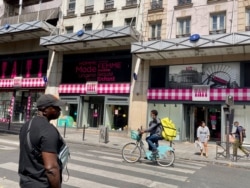For decades, the discount French department store chain Tati was a go-to place for shoppers hunting for bargains and simply the experience. Now, the last Tati store will close by year’s end — its flagship shop that has left an indelible stamp on the multiethnic Paris neighborhood where it sits.
It’s hard to miss Tati. The faded Haussmanian building with its blue-and-pink checkered sign soars above the Barbès-Rochechouart metro station. Straddling one corner of a bustling intersection, the department store is a gateway of sorts to Paris’ Goutte d’Or neighborhood, home to a large African immigrant community.
For locals like Senegalese-born Emerson Korea, Tati is simply the neighborhood store.
"It’s less expensive," Korea said. He buys shoes there, clothes for the kids. Tati, he added, offers quality goods.
There was a time when Tati stores were more visited by tourists than the Eiffel Tower. No longer. On a recent afternoon, the last Tati store of Barbes is almost empty. A few months from now, it will close.
“I think it’s a pity because this is like a whole French culture. It’s so Parisian. When you think of Paris, it’s Tati and many others,” said Natatasi, a teacher who declined to give her last name.
She has been shopping here for two decades — pretty much since she moved to Paris from her native Lesotho.
“Sometimes I don’t come to buy something specific. Like right now, I’m just walking in to see what they have. … That’s what Tati is — you never know what you’re going to find,” she said.
That sense of discovery has been part of Tati’s legacy since its founding, shortly after World War II, by Tunisian immigrant Jules Ouaki. In this northern Paris neighborhood, with its growing population of immigrants like himself, he offered up a taste of his childhood souks — putting out bales of underwear, socks and other bargain items for buyers to sift through.
The idea took off. Tati stores spread across France, then overseas, with subsidiaries opening in Abidjan, Casablanca and Libreville, even on New York’s Fifth Avenue. Here in Paris, the shops drew millions of tourists and locals — even celebrities like Brigitte Bardot.
But commentators say Ouaki’s youngest son, who took over the business in the '90s, didn’t have the same touch. He launched spinoff enterprises — in travel, telephones, optical and high fashion — that strayed from the brand’s bargain-basement roots.
In the early 2000s, the Tati brand was sold to another fashion group, then to another, Gifi. Last year, Gifi announced that remaining Tati stores except the Barbes flagship would either close or take on its brand name. Some of the African franchises have also shuttered over the years.
Ongoing yellow vest protests, then the coronavirus lockdown, dealt another blow to sales at the Barbes store. Earlier this month, Tati’s owners called it quits.
Parisian Amani Beshara cannot believe the store is closing. She’s been shopping there a long time. It’s inexpensive, she said, and everything can be found there.
The 34 remaining staff at Tati Barbes have been promised jobs after the store closes. But this neighborhood and the city are already mourning the loss of a landmark many call irreplaceable.








